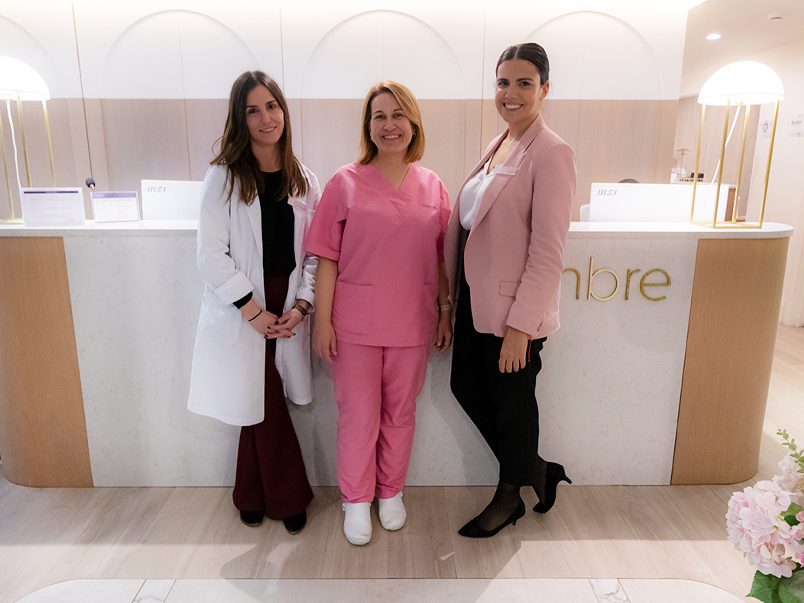blog tambre
How does Tambre select the perfect egg donor for you?

Table of contents
We understand that the journey to motherhood can be challenging, and sometimes natural conception is not possible. At Tambre, we offer advanced treatments like Artificial Insemination and In Vitro Fertilisation to help women achieve their dreams of becoming mothers. For some, Egg Donation becomes a viable option, where eggs from a donor are used in the IVF process. We know that selecting the right donor is a crucial concern for our patients, and today, we would like to shed light on how we handle this process at Tambre, hoping to alleviate any anxieties you may have.
First steps of Tambre’s egg donor selection
When a woman applies through our platform, Tambredona, in order to become an egg donor at our clinic, we have specific criteria that the potential donor must meet. She should be under 30 years old, measure over 5.09 feet (1.55 meters) tall, and have a body mass index (BMI) below 30.
If these requirements are met, the potential donor will have an initial consultation with our Nursing Team. During this visit, we gather her medical history to understand her overall health and determine if there are any medical conditions or hereditary diseases that need consideration. If everything looks good, we will explain the donation process in detail, ensuring that the woman has all the information she needs.
We want you to be aware that in Spain, egg donation is an anonymous, voluntary, and altruistic act, according to Law 14/2006 on Assisted Human Reproduction Techniques. At Tambre, we strictly adhere to this, and we ensure complete confidentiality of our donors’ identity, as stated in Article 6 of RDL 9/2017. Rest assured that all health-related data and personal information are protected and will never be disclosed to anyone.
Once a successful pregnancy is achieved, we will share certain information with the recipient, such as the blood group, age, and physical characteristics of the egg donor. However, this information will not lead to the identification of the donor, thus preserving her privacy and anonymity.
Next stage of donor selection: Mental health and medical evaluation
After passing the initial selection process, the potential donor will have an interview with our Psychology and Emotional Support Unit, led by the renowned Raquel Urteaga. The purpose of this meeting is to ensure that the donor is in good mental and emotional health, and that she is wholeheartedly committed to the donation process, driven by a genuine desire to help others.
Additionally, our medical team will conduct various tests critical to accepting her application. These tests include an ultrasound, antral follicle count, smear test, and vaginal culture to ensure her reproductive health. We also conduct a complete blood count, biochemistry, and G6PDH analysis, along with serology, blood group and RH factor test.
To facilitate the donor-recipient match later on, we study the donor’s karyotype and conduct other genetic tests, including cystic fibrosis, fragile X syndrome, basic recessive mutations and carrier status tests for more than 300 genes.
Once we confirm the woman’s eligibility to donate and that she is capable of helping other women and couples achieve a healthy pregnancy, she will start the ovarian stimulation process and undergo follicular puncture. At the same time, the recipient will prepare her endometrium for fresh cycles or adopt a more flexible schedule if her gametes will be frozen.
How do Tambre’s professionals perform the donor-recipient matching?
The donor-recipient matching is a thoughtful and considerate process. We take into account physical characteristics and blood groups of both parties, aiming to find a donor who closely resembles the recipient. To assist with this, we use the Fenomatch technology, an artificial intelligence platform that compares facial biometrics to identify the egg donor who bears the closest resemblance to the prospective mother.
Genetic compatibility is equally crucial, and we ensure this through a technique called genetic matching. We also confirm immunological compatibility, if required, through KIR-HLA-C genotyping, which studies the compatibility between the recipient’s uterine KIR and the HLA-C molecules presented by the embryo.
Above all, effective communication between our doctors and patients is paramount. We strive to individualise each treatment, provide comprehensive information about the entire process, empathize with our patients, and make them feel listened and supported throughout their journey.
We understand the uncertainties and concerns you may have, and, at Tambre, we firmly believe that donors are not “good” or “bad” – they are simply a good match for the recipient. Every mother is unique, and our mission is to find a donor who closely resembles her and is compatible, ensuring a successful pregnancy. If you’re currently undergoing Egg Donation treatment and still have concerns, please do not hesitate to reach out to us. Our dedicated team is here to support you every step of the way!
